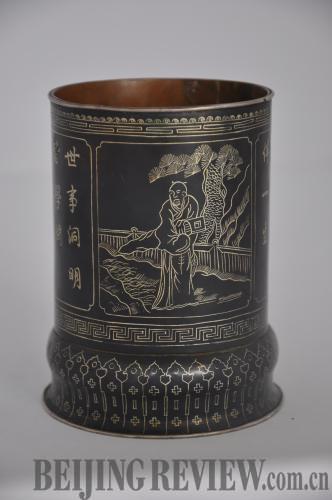|
A studio was established in Guandu Town in Kunming on August 18, 2010, to pass down the bronze ware technique. Jin accepted four apprentices among 38 applicants who earnestly wanted to learn the technology after seeing a report on Approaching Science, a program of the China Central Television (CCTV).
"The most important standard for an apprentice is to be upright and of high moral standing," said Jin, adding that "a person is not qualified to be a disciple if they are quick to quarrel with others, because it shows a lack of patience."
 |
|
A pencil vase made of black bronze adorned with a picture of a young apprentice |
Each of the four apprentices are ardent to learn the technique, and have already learned such techniques as carving, burnishing, and tracing lines on the carved patterns with silver, despite a lack of artisanal background.
Disciples need not pay tuitions except for fees of materials, since the learning process requires using a large amount of metals.
"Domestic consumers have increased recently, so the orders have lined up till the end of this October," said Zhang Yi, who is also sales manager of the Yunnan Traditional Tungsten Silver Gilt Adornment Trade Co. Ltd. "As the products are all pure handcraft works, each small piece of work needs at least five to six days, and larger pieces can take three to four months," said Zhang.
Sales volume of the company reached 1 million yuan ($15,600) yearly, and its products usually sell on trade fairs or directly through the company's website.
With the expansion of the studio since 2010, Jin has had no time to visit the market. He works for three or five hours a day in spite of his age, and in his spare time he sings local dianju opera, another national intangible cultural heritage.
"The art of singing opera and crafts making are related. A person in a bad mood cannot make a good work of art," said Jin. "When I'm in bad mood, I go to the tea house or sing opera at a theater. When I'm in a good mood, my works look better and are appreciated more," Jin said.
| 